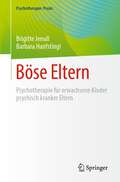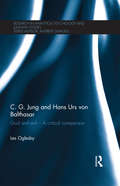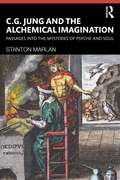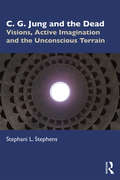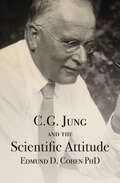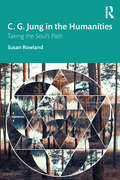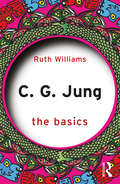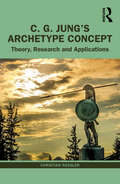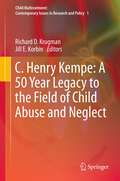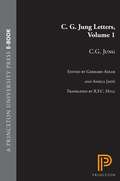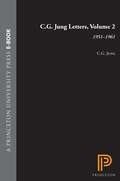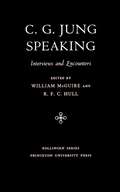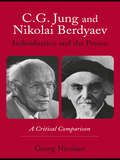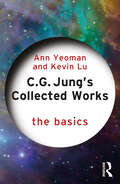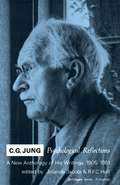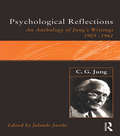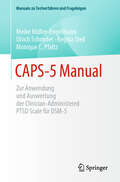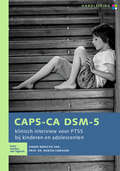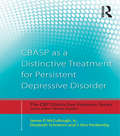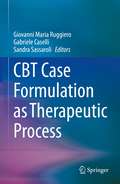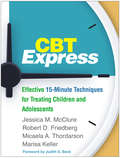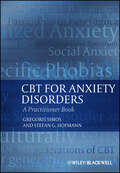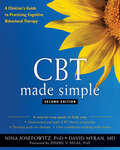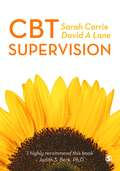- Table View
- List View
Böse Eltern: Psychotherapie für erwachsene Kinder psychisch kranker Eltern (Psychotherapie: Praxis)
by Brigitte Jenull Barbara HanfstinglIn diesem Buch berichten erwachsene Frauen, wie sie ihre Situation als Kinder psychisch kranker Eltern erlebten, was ihnen geholfen hat, mit diesen Belastungen umzugehen und wo sie heute noch an ihre Grenzen kommen. Dieser Perspektivenwechsel ermöglicht eine Begegnung auf Augenhöhe und dient als Grundlage für ein individualisiertes Risiko-Resilienz-Modell, um Handlungsoptionen und Interventionsstrategien für die Psychotherapie und Beratung abzuleiten. Aus dem Inhalt: Was tun, wenn der Vater Gewalt ausübt oder mit Schweigen straft? Wie die eigene Mutter stoppen, wenn sie im Vollrausch viel zu schnell Auto fährt? Was spielt sich in den Köpfen der Kinder ab? Holen sie Hilfe und bekommen sie Hilfe? Über welche Strategien verfügen sie, damit sie an so einem Alltag nicht zerbrechen? Und: Fühlen sich resiliente Kinder wirklich so stark, wie dies ihnen Außenstehende zusprechen? Über die Autorinnen: Dr. Brigitte Jenull ist Außerordentliche Universitätsprofessorin an der Universität Klagenfurt, Klinische und Gesundheitspsychologin, Psycho- und Lehrtherapeutin und arbeitet seit vielen Jahren mit Menschen, die solche und ähnliche Schicksale erlebten, wie sie in diesem Buch beschrieben sind. Dr. Barbara Hanfstingl ist Assoziierte Professorin an der Universität Klagenfurt, Psychotherapeutin in Ausbildung und beschäftigt sich in ihrer Forschung mit dem Entstehen von psychologischer Resilienz.
C. G. Jung and Hans Urs von Balthasar: God and evil - A critical comparison (Research in Analytical Psychology and Jungian Studies)
by Les OglesbyThis book brings together the work of Carl Gustav Jung and Hans Urs von Balthasar, two of the most creative thinkers in psychology and theology in the twentieth century, to critically compare their ideas on the perennial question of God’s involvement with evil. In later life Jung embarked on a project relating to Christianity, with psychotherapeutic and theological intentions, forming his collection of essays, Symbolik des Geistes, in which God and evil was a major theme. Balthasar gave significant attention to Jung’s psychology in his own theological trilogy, but opposed the approach to God and evil that Jung presented. In this book Les Oglesby provides a thorough examination of convergences and divergences in Jung and Balthasar’s thinking, their different approaches to the origins and reality of evil, as well as their alternative theological orientations. The book culminates with a study of each man’s understanding of the central event of Christianity, Christ’s death on the Cross and his descent to the dead and discusses how Balthasar’s ‘vertical’ and Jung’s ‘horizontal’ approach to this major happening can be held together fruitfully with one another. Illustrating how analytical psychology and Christian theology can mutually enrich one another when they are held in creative tension, this book invites reflection on the meaning of the central symbol of Christianity, and God’s involvement with evil as an aid to integrated psychological living and theological maturity. It will prove fascinating for students of psychology and religion as well as for Jungian analysts and practical theologians.
C. G. Jung and the Alchemical Imagination: Passages into the Mysteries of Psyche and Soul
by Stanton MarlanStanton Marlan brings together writings which span the course of his career, examining Jungian psychology and the alchemical imagination as an opening to the mysteries of psyche and soul. Several chapters describe a telos that aims at the mysterious goal of the Philosophers’ Stone, a move replete with classical and postmodern ideas catalysed by prompts from the unconscious: dreams, images, fantasies, and paradoxical conundrums. Psyche and matter are seen with regards to soul, light and darkness in terms of illumination, and order and chaos as linked in the image of chaosmos. Marlan explores the richness of the alchemical ideas of Carl Jung, James Hillman, and others and their value for a revisioning of psychology. In doing so, this volume challenges any tendency to literalism and essentialism, and contributes to an integration between Jung’s classical vision of a psychology of alchemy and Hillman’s Alchemical Psychology. C.G. Jung and the Alchemical Imagination will be a valuable resource for academics, scholars, and students of Jungian and post-Jungian studies, Jungian analysis, and psychotherapy. It will also be of great interest to Jungian psychologists and Jungian analysts in practice and in training.
C. G. Jung and the Dead: Visions, Active Imagination and the Unconscious Terrain
by Stephani L. StephensC. G. Jung and the Dead: Visions, Active Imagination and the Unconscious Terrain offers an in-depth look at Jung’s encounters with the dead, moving beyond a symbolic understanding to consider these figures a literal presence in the psyche. Stephani L. Stephens explores Jung’s personal experiences, demonstrating his skill at visioning in all its forms as well as detailing the nature of the dead. This unique study is the first to follow the narrative thread of the dead from Memories, Dreams, Reflections into The Red Book, assessing Jung’s thoughts on their presence, his obligations to them, and their role in his psychological model. It offers the opportunity to examine this previously neglected theme unfolding during Jung’s period of intense confrontation with the unconscious, and to understand active imagination as Jung’s principle method of managing that unconscious content. As well as detailed analysis of Jung’s own work, the book includes a timeline of key events and case material. C. G. Jung and the Dead will offer academics and students of Jungian and post-Jungian studies, the history of psychology, Western esoteric history and gnostic and visionary traditions a new perspective on Jung’s work. It will also be of great interest to Jungian analysts and psychotherapists, analytical psychologists and practitioners of other psychological disciplines interested in Jungian ideas.
C. G. Jung and the Scientific Attitude
by Edmund D. CohenThis probing study of the pioneering psychologist dispels many of the popular misconceptions about his work. Though Carl Jung is well known as one of the great pioneers of psychology and psychoanalysis, there are many persistent misconceptions about his work and legacy. Jungian psychology is rigorously scientific, yet its critics dismiss it as obscure and mystical. In C. G. Jung and the Scientific Attitude, Edmund D. Cohen sheds light on significant aspects of Jung&’s work that academic psychology has previously all but overlooked. Though Jung&’s productivity spanned more than fifty years, his reputation rests largely on statements he made early in his career—statements upon which he later improved. In this fascinating and enlightening analysis, Cohen explores these statements and the misunderstandings they have caused. He also looks at the many paradoxes of Jungian psychology, showing that what first appears to be merely contradictory turn out to reveal a deeper meaning.
C. G. Jung in the Humanities: Taking the Soul's Path
by Susan RowlandThis book demonstrates for the first time the significance of Jung’s work to the humanities, and to those areas where the humanities and sciences share borders. More radically, it shows that Jung was a writer of myth, alchemy, narrative, and poetics, as well as on them. Jung’s core concepts are introduced, their ongoing relevance is championed. The book also addresses Jung’s sometimes questionable judgment on politics and gender, and previews contemporary extensions of Jungian theory. By privileging the creative psyche and exploring the connections between individual, natural environment, and social/psychological collective, Jung anticipates the new holism, offering the promise of reconciling the sciences with the arts, humanity with nature.
C. G. Jung: The Basics (The Basics)
by Ruth WilliamsC. G. Jung: The Basics is an accessible, concise introduction to the life and ideas of C. G. Jung for readers of all backgrounds, from those new to Jung’s work to those looking for a convenient reference. Ruth Williams eloquently and succinctly introduces the key concepts of Jungian theory and paints his biographical picture with clarity. The book begins with an overview of Jung’s family life, childhood, and relationship with (and subsequent split from) Sigmund Freud. Williams then progresses thematically through the key concepts in his work, clearly explaining ideas including the unconscious, the structure of the psyche, archetypes, individuation, psychological types and alchemy. C. G. Jung: The Basics also presents Jung’s theories on dreams and the self, and explains how his ideas developed and how they can be applied to everyday life. The book also discusses some of the negative claims made about Jung, especially his ideas on politics, race, and gender, and includes detailed explanations and examples throughout, including a chronology of Jung’s life and suggested further reading. C. G. Jung: The Basics will be key reading for students at all levels coming to Jung’s ideas for the first time and general readers with an interest in his work. For those already familiar with Jungian concepts, it will provide a helpful guide to applying these ideas to the real world.
C. G. Jung’s Archetype Concept: Theory, Research and Applications
by Christian RoeslerThe concept of archetypes is at the core of C. G. Jung’s analytical psychology. In this interesting and accessible volume, Roesler summarises the classical theory of archetypes and the archetypal stages of the individuation process as it was developed by Jung and his students. Various applications of archetypes, in cultural studies as well as in clinical practice, are demonstrated with detailed case studies, dream series, myths, fairy tales, and so on. The book also explores how the concept has further developed as a result of research and, for the first time, integrates findings from anthropology, human genetics, and the neurosciences. Based on these contemporary insights, Roesler also makes a compelling argument for why some of Jung’s views on the concept should be comprehensively revised. Offering new insights on foundational Jungian topics like the collective unconscious, persona, and shadow, C. G. Jung’s Archetype Concept is of great interest to Jungian students, analysts, psychotherapists, and scholars.
C. Henry Kempe: A 50 Year Legacy To The Field Of Child Abuse And Neglect (Child Maltreatment #1)
by Richard D. Krugman Jill E. KorbinThe book series, "Child Maltreatment: Contemporary Issues in Research and Policy." will consist of a state of the art handbook (to be revised every five years) and two to three volumes per year. The first volume in this series is a legacy to C. Henry Kempe. This is a timely publication because 2012 marks 50 years after the appearance of the foundational article by C. Henry Kempe and his colleagues, "The Battered-Child Syndrome." This volume capitalizes on this 50 year anniversary to stand back and assess the field from the perspective that Dr. Kempe's early contributions and ideas are still being played out in practice and policy today. The volume will be released at the next ISPCAN meeting, also in 2012.
C.G. Jung Letters, Volume 1: Volume I, 1906-1950 (Bollingen Series #672)
by C. G. JungBeginning with Jung's earliest correspondence to associates of the psychoanalytic period and ending shortly before his death, the 935 letters selected for these two volumes offer a running commentary on his creativity. The recipients of the letters include Mircea Eliade, Sigmund Freud, Esther Harding, James Joyce, Karl Kernyi, Erich Neumann, Maud Oakes, Herbert Read, Upton Sinclair, and Father Victor White.
C.G. Jung Letters, Volume 2: 1951-1961
by C. G. JungBeginning with Jung's earliest correspondence to associates of the psychoanalytic period and ending shortly before his death, the 935 letters selected for these two volumes offer a running commentary on his creativity. The recipients of the letters include Mircea Eliade, Sigmund Freud, Esther Harding, James Joyce, Karl Kernyi, Erich Neumann, Maud Oakes, Herbert Read, Upton Sinclair, and Father Victor White.
C.G. Jung Speaking: Interviews and Encounters (Bollingen Series #650)
by William McGuire R.F.C. HullA collection of journalistic interviews which span Jung's lifetime. This book captures his personality and spirit in more than 50 accounts of talks and meetings with him. They range from transcripts of interviews for radio, television, and film to memoirs written by notable personalities.
C.G. Jung and Nikolai Berdyaev: A Critical Comparison
by Georg NicolausThis book explores C. G. Jung's psychology through the perspective of the existential philosopher Nikolai Berdyaev, drawing striking parallels between Jung's theory of individuation and Berdyaev's understanding of the person. Placing Jung and Berdyaev firmly within the context of secular humanism, Nicolaus draws on their personal experiences of individuation to show how both writers seek to enable a renewal of our self-understanding as persons in a post-religious society. Topics of discussion include: the foundations of Berdyaev's personalism Jung's psychological interpretation of the Christian God-image individuation and the ethics of creativity. C. G. Jung and Nikolai Berdyaev: Individuation and the Person offers a fresh perspective on the ethical implications of Jung’s theory and serves also as an introduction to Berdyaev’s thought. As such this book will appeal to analytical psychologists, scholars engaged with Jungian thought and all those interested in the interface between spirituality and depth psychology.
C.G. Jung's Collected Works: The Basics (The Basics)
by Ann Yeoman Kevin LuThis new introduction to Jung’s Collected Works—written in lively and accessible style—provides a comprehensive guide to key concepts in analytical (Jungian) psychology while charting the creative evolution of Jung’s thought through his own words.Invaluable to both beginners and those more experienced with Jungian theory, this book provides tables listing key readings for further study of the Collected Works, clear explication of fundamental principles, chapter summaries, prompts for deepening a critical engagement with Jung’s texts, a glossary of key terms, and suggestions for further reading.This text will be an invaluable introduction for those coming to the Collected Works for the first time as well as a useful reference for readers familiar with the collection.
C.G. Jung: Psychological Reflections. A New Anthology of His Writings, 1905-1961 (Bollingen Series #679)
by C. G. JungCarl Gustav Jung, the great Swiss psychologist, who died in 1961 in his eighty-sixth year, was a profound thinker of extraordinary creativity. In the course of his medical practice he reflected deeply on human nature and human problems, and his prolific writings bear witness to his great wisdom and insight.For this completely revised edition, selections from publications of the years 1945-1961, the last fruitful years of Jung's life, have been added, and the book has been reset in a new compact format. The selections are arranged thematically under four main headings: The Nature and Activity of the Psyche, Man in His Relation to Others, The World of Values, and On Ultimate Things.Jung's reflections frequently have a penetrating relevance to today's (and tomorrow's) problems. On prejudice: "Our unwillingness to see our own faults and the projection of them is the beginning of most quarrels, and is the strongest guarantee that injustice, animosity, and persecution are not ready to die out." On sex: "We are not yet far enough advanced to distinguish between moral and immoral behavior in the realm of free sexual activity." On religion: "No one can know what the ultimate things are. We must therefore take them as we experience them. And if such experience helps to make life healthier, more beautiful, more complete, and more satisfactory to yourself and to those you love, you may safely say: 'This was the grace of God.'"
C.G.Jung: A New Anthology of His Writings 1905-1961 (500 Tips #Vol. 31)
by Jolande JacobiC. G. Jung was one of the great thinkers of our time. In the course of his long medical practice he reflected deeply on human nature and human problems, and his profile writings bear witness to his wisdom and insight. This anthology of his writings, containing nearly thirteen hundred quotations is the perfect introduction to jung's works.
CAPS-5 Manual: Zur Anwendung und Auswertung der Clinician-Administered PTSD Scale für DSM-5 (Manuale zu Testverfahren und Fragebögen)
by Ulrich Schnyder Meike Müller-Engelmann Regina Steil Monique PfaltzDie Clinician-Administered PTSD Scale (CAPS) ist ein strukturiertes klinisches Interview zur Erfassung der Symptome der posttraumatischen Belastungsstörung (PTBS). Mit Hilfe dieses Interviews können die verschiedenen Symptome der PTBS gemäß DSM-5 erfasst werden.Die CAPS-5 ermöglichst sowohl die Stellung der PTBS Diagnose nach DSM-5 als auch die Bestimmung eines Gesamtschweregrads der Symptomatik, sowie die Bestimmung des Schweregrads der einzelnen Symptomcluster. Zusätzlich kann mit der CAPS-5 das subjektive Leiden, die Auswirkung der Symptome auf das soziale und berufliche Funktionsniveau und die Veränderung seit der letzten Symptomerfassung bestimmt werden. Darüber hinaus erlaubt die CAPS-5 die Bestimmung des dissoziativen Subtypus der PTBS. Die CAPS gilt generell als Goldstandard zur Erfassung der Symptome der PTBS, insbesondere im Bereich der Psychotherapieforschung, da sich mit ihrer Hilfe die Wirksamkeit von Interventionen reliabel abbilden lässt. Das Interview wurde für die Anwendung durch Psychologen und Psychiaterinnen konzipiert, die in der klinischen Versorgung und/oder Forschung tätig sind.Das vorliegende Manual gibt einen Überblick über die Zielsetzung der CAPS-5, ihren Aufbau, sowie die Durchführung und Auswertung des Interviews. Der Schwerpunkt liegt dabei darin, den Interviewer bei der Durchführung und Auswertung des Interviews zu unterstützen. So finden sich im Manual ausführliche Hinweise zur Einschätzung des Vorliegens der einzelnen Symptome sowie zum Umgang mit schwierigen Situationen während des Interviews.
CAPS-CA DSM-5 – handleiding: Klinisch interview voor PTSS bij kinderen en adolescenten
by Ramón LindauerDoel van de testDe CAPS-CA 5 is een semigestructureerd interview voor het diagnosticeren van post-traumatische stressstoornis (PTSS) en acute stressstoornis bij kinderen en adolescenten volgens de criteria van de DSM 5. Onbehandelde PTSS heeft bij kinderen en adolescenten een ernstige negatieve invloed op de ontwikkeling en het psychosociaal functioneren, terwijl evidence-based traumabehandelingen beschikbaar zijn. Signalering van traumagerelateerde klachten is dan ook van belang om ernstige problemen op het gebied van de psychosociale ontwikkeling te voorkomen. Toepassing• Individuele diagnostiek: stelt de aanwezigheid van PTSS en acute stressstoornis vast volgens de DSM 5. Stelt de impact vast van de aanwezige symptomen op het psychosociaal functioneren.• Evaluatie: meet het effect van (evidence-based) traumabehandeling.Wat meet de CAPS-CA 5?De CAPS-CA 5 meet de frequentie en de intensiteit van symptomen die samenhangen met de DSM 5 PTSS-kenmerken en stelt daarnaast vast wat de impact van deze symptomen is. Voor wie?De CAPS-CA 5 wordt afgenomen door psychologen, orthopedagogen en kinder- en jeugdpsychiaters. Afname en scoringDe CAPS-CA 5 wordt individueel bij kinderen afgenomen. De duur van het interview is ca. 45-60 minuten (afhankelijk van de leeftijd van het kind, en de ernst en type van het trauma). Hulpmiddelen bij de afnameEr zijn hulpmiddelen die men kan gebruiken bij de afname van de CAPS-CA 5: een kalender, een intensiteitsblad en een frequentieblad. Deze hulpmiddelen zijn gratis downloadbaar via de BSL site en te vinden op de pagina van de complete set van de CAPS-CA 5. Het intensiteitsblad en frequentieblad zijn ook als herbruikbare plastic kaart opgenomen in de complete set. NormenDe CAPS-CA 5 wordt vooralsnog gebruikt met de valideringsgegevens van de vorige editie van de CAPS-CA uit 2014 die werd onderzocht met een groep kinderen die één of meer traumatische gebeurtenissen meemaakten en met kinderen die stressvolle gebeurtenissen meemaakten die niet aan het A-criterium voldeden. Deze valideringsgegevens zijn al bijlag opgenomen in de handleiding van de CAPS-CA 5. Materiaal• Complete set (handleiding, set interviewboekjes, frequentiekaart en intensiteitskaart)• Interviewboekjes (set van 10 stuks)
CBASP as a Distinctive Treatment for Persistent Depressive Disorder: Distinctive features (CBT Distinctive Features)
by J. Kim Penberthy James P. McCullough, Jr. Elisabeth SchrammThe Cognitive Behavioural Analysis System of Psychotherapy (CBASP) is the only psychotherapy model developed specifically for chronic depression. In the latest addition to the successful Distinctive Features series, the developer of CBASP, James P. McCullough Jr., along with Elisabeth Schramm and J. Kim Penberthy, provides an accessible introduction to this approach, showing how it differs from other cognitive behavioural approaches, and highlighting those features – both theoretical and practical – that make it unique. The unparalleled problems of the chronically depressed patient are some of the most difficult that practitioners face. The disorder has usually continued for a decade or more and patients enter psychotherapy interpersonally withdrawn, detached and with little or no motivation to change. CBASP as A Distinctive Treatment for Persistent Depressive Disorder provides a new look into the phenomenological world of the patient and shows the reader why the world-view of the patient is a valid perception of reality. CBASP is designed to address the problems of the patient in a step-by-step manner. This book explores the therapist role and shows how the CBASP model enables therapists to address the patient’s depression in a zone of interpersonal safety. Patients are taught how to behave in an interpersonally facilitative manner and shown how everything they do has consequences for others (including the therapist) and on the social environment in which they live. CBASP as A Distinctive Treatment for Persistent Depressive Disorder will be essential reading for novice and experienced CBT therapists, counselors and psychotherapists treating chronic depression.
CBT Case Formulation as Therapeutic Process
by Giovanni Maria Ruggiero Gabriele Caselli Sandra SassaroliThis book reasserts the importance of case formulation as the first step in implementing effective cognitive behavioral therapies (CBT), centering it as the main operative tool of CBT approaches by which the therapist handles the whole psychotherapeutic process. Chapters discuss specific CBT interventions and components of the treatment, aspecific factors including therapeutic alliance and relationship, and theoretical and historical background of CBT practices. In addition, the book assumes that in CBTs the case formulation is a procedure which is continuously shared and reevaluated between patient and therapist throughout the course of treatment. This aspect is increasingly becoming the distinguishing feature of CBT approaches as it embodies CBT's basic tenets and implies full confidence in patients’ conscious agreement, transparent cooperation and explicit commitment with CBT’s model of clinical change.
CBT Express: Effective 15-Minute Techniques for Treating Children and Adolescents
by Robert D. Friedberg Jessica M. McClure Micaela A. Thordarson Marisa KellerOffering vital tools for working with 4- to 18-year-olds in a wide range of settings, this book presents engaging cognitive-behavioral therapy (CBT) activities that can be implemented rapidly and flexibly. Concise chapters guide the provider to quickly identify meaningful points of intervention for frequently encountered clinical concerns, and to teach and model effective strategies. Each intervention includes a summary of the target age, module, purpose, rationale, materials needed, and expected time for completion, as well as clear instructions and sample dialogues and scripts. In a convenient large-size format, the book features helpful graphics and 77 reproducible handouts and worksheets in the form of Handy and Quick (HQ) Cards. Purchasers get access to a Web page where they can download and print the reproducible materials.
CBT For Anxiety Disorders
by Stefan G. Hofmann Gregoris SimosCBT for Anxiety Disorders presents a comprehensive overview of the latest anxiety disorder-specific treatment techniques contributed by the foremost experts in various CBT approaches.Summarizes the state-of-the-art CBT approaches for each of the DSM anxiety disordersRepresents a one-stop tool for researchers, clinicians, and students on CBT for anxiety disordersFeatures world leading CBT authors who provide an up to date description of their respective treatment approaches in a succinct, and clinician-tailored, fashion
CBT Made Simple: A Clinician's Guide to Practicing Cognitive Behavioral Therapy
by Nina Josefowitz David MyranIn this second edition of CBT Made Simple, two renowned psychologists and experts in cognitive behavioral therapy (CBT) offer the most comprehensive manual available to help professionals learn CBT and deliver it to clients for better treatment outcomes. <P><P> CBT is an evidence-based treatment for several mental health disorders, including anxiety, depression, obsessive-compulsive disorder (OCD), post-traumatic stress disorder (PTSD), and anger problems. This simple, pragmatic guide offers everything you need to know about CBT: what it is, how it works, and how to implement it in session. <P><P> This fully revised and updated second edition of CBT Made Simple provides a user-friendly, practical approach to learning CBT using up-to-the-minute teaching methods and learning tools—in particular, the “effective adult learning model,” which promotes interactive learning, experiential learning, and self-reflection. Each chapter presents key elements of CBT in clear, accessible language, and includes client dialogues and clinical examples. Practical exercises are incorporated throughout, enabling you to practice and consolidate your learning. In addition, each chapter mimics the structure of an actual CBT session.
CBT Supervision
by David A Lane Sarah CorrieWhat is good CBT supervision? What makes an effective supervisor? How can qualified CBT therapists learn to become good CBT supervisors who work effectively with their supervisees? These are some of the questions addressed in this practical new book, examining what it takes to be a competent and confident CBT supervisor. Using the authors' unique framework of learning - the PURE Supervision Flower - the book equips trainees with the skills and competencies needed to prepare for, undertake, refine and enhance supervision practice across a wide range of settings. Structured around the PURE Supervision Flower, the book is divided into four parts: Preparing for Supervision explores how to establish an effective and ethical base from which supervision can occur Undertaking Supervision focuses on the practical delivery of CBT Supervision Refining Supervision offers insights into managing the supervisory process and relationship Enhancing Supervision hones competencies by considering complex ethical challenges and CPD. Packed with activities, tips, case studies and reflective questions to help consolidate learning, this is essential reading for CBT practitioners training in and already providing supervision across a range of settings.
CBT Supervision
by David A Lane Sarah CorrieWhat is good CBT supervision? What makes an effective supervisor? How can qualified CBT therapists learn to become good CBT supervisors who work effectively with their supervisees? These are some of the questions addressed in this practical new book, examining what it takes to be a competent and confident CBT supervisor. Using the authors' unique framework of learning – the PURE Supervision Flower – the book equips trainees with the skills and competencies needed to prepare for, undertake, refine and enhance supervision practice across a wide range of settings. Structured around the PURE Supervision Flower, the book is divided into four parts: Preparing for Supervision explores how to establish an effective and ethical base from which supervision can occur Undertaking Supervision focuses on the practical delivery of CBT Supervision Refining Supervision offers insights into managing the supervisory process and relationship Enhancing Supervision hones competencies by considering complex ethical challenges and CPD. Packed with activities, tips, case studies and reflective questions to help consolidate learning, this is essential reading for CBT practitioners training in and already providing supervision across a range of settings.
